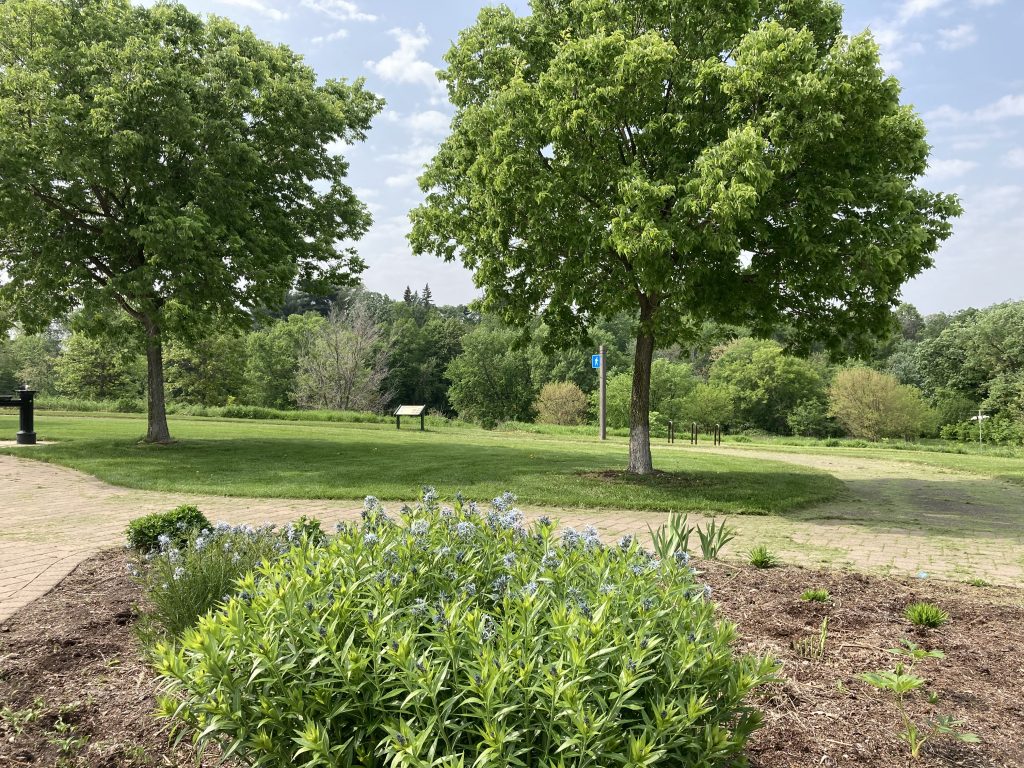4.5 miles
longfellow gardens and back
67 degrees
For today’s run, I decided to go past the falls to Longfellow Gardens. Since I was reading Mary Ruefle’s prose poem about purple sadness, my plan was to visit my favorite purple flowers. When I reached the gardens I discovered that they haven’t been planted yet. Thanks strange spring with your late snow storms and unending cold weather in April!
Another one of those wonderful spring days with sunshine and birdsong. A week ago I would have added “no bugs,” but they’ve arrived. All this week, mosquitoes have been feasting on my elbows, under my knees, my wrist. Today a gnat died on the side of my nose. I could see it through my peripheral vision. Another flew into my eye. Yuck!
My right big toe hurt again for a few minutes, then it was fine.
Heard the wind, water gushing out of the sewer pipes, the falls roaring, kids laughing at the playground, one little kid in a stroller that was over everything, a giant mower or weed whacker or some other noisy machine near the Longfellow House.
Smelled cigarette smoke as I passed a guy on the trail. Was he smoking or was it just his clothes?
surfaces: tightly packed dirt, half buried tree roots, grass, hay, asphalt, concrete, road, street, sidewalk, brick, dead leaves, crumbling asphalt — some mostly asphalt, some with big chunks of asphalt mixed with leaves and dirt, some rubble, limestone steps
Mary Ruefle, Immortal Cupboards, Windows, Offerings, and a Purple Wood
Today I’m reading Ruefle’s lecture, “My Emily Dickinson” and her purple sadness poem.
immortal cupboards
J. D. Salinger once remarked, “A writer, when he’s asked to discuss his craft, ought to get up and call out in a loud voice just the names of the writers he loves…”
“My Emily Dickinson” / Mary Ruefle, page 150
That lovely little book. I’ve had nothing affect me quite so much since I discovered haiku. But then you come from Japan! You now inhabit a corner of my immortal cupboard with LZ (especially the short poems), Emily Dickinson, Thoreau, Lucretius, Marcus Aurelius, John Muir, bits from Santayana, D.H. Lawrence, Dahlberg, William Carlos Williams, and haiku. These knew “when / to listen / what falls / glistens now / in the ear.”
Lorine Niedecker in a letter to Cid Corman
Emily Dickinson is also in my immortal cupboard, along with Mary Oliver, Lorine Niedecker, Marie Howe, possibly Alice Oswald, definitely Rita Dove.
windows
Emily Dickinson often looked out of her bedroom window, and many of her poems, if not her worldview, seem framed by this fact; so much has been made of this there is little I can add; to argue whether a window is the emblem of complete objectivity (removal and distance) or complete subjectivity (framing and viewpoint) is an argument without end, for every window has two sides, and they are subsumed in the window, the way yearning, a subsidiary of the window, is subsumed in both the object yearned for, and the subject of its own activity.
“My Emily Dickinson”/ Mary Ruefle, page 151
offerings
But she has a common grave, and I like to go there and leave things, and when I did, I see that many other people have done the same.
“My Emily Dickinson” / Mary Ruefle, page 182
list of offerings left (real or imagined) throughout Ruefle’s lecture:
- a stone, a penny, a small bronze alien
- two plastic champagne glasses, pink and purple larkspur, an ear
- a lemon, a dime, a diamond ring, a parachute
- a white rose, a fortune-telling passionate fish, ice cream for astronauts
- a sheaf of flowers from the florist with a thank-you note attached, a plastic fly, a nickel, an egg
- A stick of gum wrapped in foil. A shard of glass.
- a plastic watch, a feather, some Kleenex
- Nothing.
- lilacs, a spool of thread, a book of matches, a mood ring
- an envelope, addressed but otherwise empty, a piece of gum in silver paper, a packet of nasturtium seeds, and a button
- a thimble, an acorn, a quarter, and many, many daffodils
- yellow snapdragons. A robin made of tin. A child’s block with the letter E. A pen. A pinecone. A tiny hat. An Austrailian coin.
- a paratrooper, a cork
- s piece of coal, a candle stub, a chrysanthemum
- a small gargoyle, a rubber heart, an old key, a guitar pick a sequin, a sprig of heather, and a piece of hair
- A doorknob.
a purple wood
A lane of yellow led the eye
Unto a Purple Wood
Whose soft inhabitants to be
Surpasses solitude
(Emily Dickinson)
from My Private Property/ Mary Ruefle
Purple sadness is the sadness of classical music and eggplant, the stroke
of midnight, human organs, ports cut off for a part of every year, words
with too many meanings, incense, insomnia, and the crescent moon. It is
the sadness of play money, and icebergs seen from a canoe. It is possible
to dance to purple sadness, though slowly, as slowly as it takes to dig a pit
to hold a sleeping giant. Purple sadness is pervasive, and goes deeper into
the interior than the world’s greatest nickel deposits, or any other sadness
on earth. It is the sadness of depositories, and heels echoing down a long
corridor, it it the sound of your mother closing the door at night, leaving
you alone.
Just discovered how the ends of her lines create another poem:
Stroke
words
it is possible
to dig a pit
deeper into
sadness
a long
leaving
The last words, leaving you alone, reminds me of Ruefle’s discussion of Emily Bronté, and Emily Dickinson in My Emily Dickinson:
Emily Dickinson never lived alone for a single day in her life.
Emily Bronté never lived alone for a single day in her life.
before the run
Today on my run, I want to think about purple, and I plan to run the 2+ miles it takes to get to longfellow gardens where some of my favorite purple flowers dwell (or have dwelled in past springs). What are these flowers called? I have no idea.
other purples to think about: heels echoing, doors creaking closed, deep pits.
during the run
No flowers. well, I did find some flowers that were white, but looked like they could be or would be or should be turning purple. Also, a reddish-purple plant. I took some pictures:


I can’t really see any purple in these, or much of anything, but maybe you can?
Other purple things I remember encountering: the gentle, queer curve of a branch towering over the trail — as I ran under it I thought, that’s very purple. Then the face of a child in the midst of bellowing frustration — I didn’t see their face, but I imagined it could be a deep purple. Purple whispers in the trees.
No purple cars or shirts or shoes or bikes or signs or birds or left behind objects in the grass. Mostly just green and blue.
after the run
Apparently the leaving of strange offerings at Emily Dickinson’s grave is a thing. In her play on Susan Howe’s My Emily Dickinson and Ruefle’s My Emily Dickinson, Meg Shevenock writes, in My My Emily Dickinson:
Then, there’s this: after visiting Emily’s house, my friends and I made a small parade to visit her grave, and the objects I knew would be there, were there. Best of all, a white plastic pen with white cap from a hotel. Or best of all, a blue pencil cracked and dried, that had weathered so much snow. We all want her to say more, write more, about who she was; or, we want to say, I get it, I’m a writer too, and we also know it’s impossible, so we leave an object from the world, from a day long beyond her breathing, to get as close to touching as stone.
My My Emily Dickinson/ Meg Shevenock